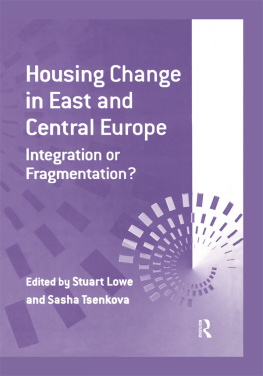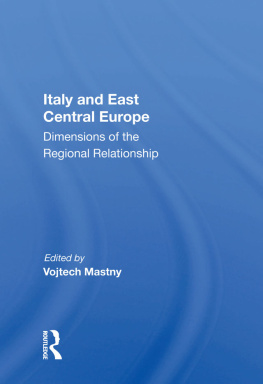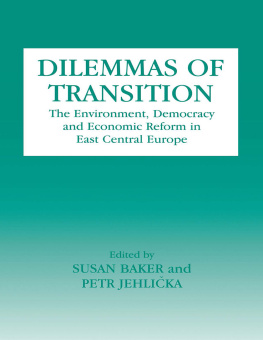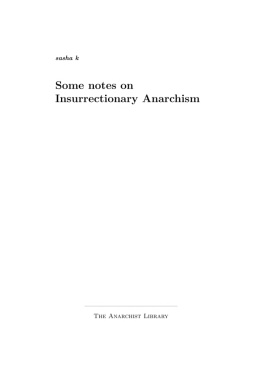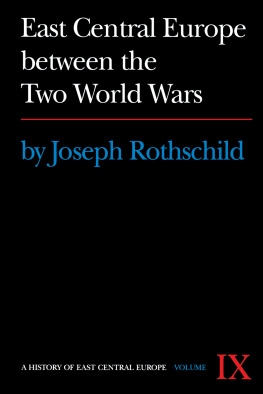First published 2003 by Ashgate Publishing
Published 2017 by Routledge
2 Park Square, Milton Park, Abingdon, Oxon 0X14 4RN
711 Third Avenue, New York, NY 10017, USA
Routledge is an imprint of the Taylor & Francis Group, an informa business
Copyright Stuart Lowe and Sasha Tsenkova 2003
All rights reserved. No part of this book may be reprinted or reproduced or utilised in any form or by any electronic, mechanical, or other means, now known or hereafter invented, including photocopying and recording, or in any information storage or retrieval system, without permission in writing from the publishers.
Notice:
Product or corporate names may be trademarks or registered trademarks, and are used only for identification and explanation without intent to infringe.
British Library Cataloguing in Publication Data
Housing change in East and Central Europe : integration or
fragmentation?
1. Housing policy - Europe, Central 2. Housing policy -
Europe, Eastern
I. Lowe, Stuart, 1950- II. Tsenkova, Sasha
363.580943
Library of Congress Cataloging-in-Publication Data
Housing change in East and Central Europe : integration or fragmentation? / edited by
Stuart Lowe and Sasha Tsenkova.
p. cm.
Includes bibliographical references and index.
ISBN 0-7546-1814-5
1. Housing policy--Europe, Eastern. 2. Housing policy--Europe, Central. 3. Public
housing--Europe, Eastern. 4. Public housing--Europe, Central. 5. Privatization--Europe,
Eastern. 6. Privatization--Europe, Central. I. Lowe, Stuart. II. Tsenkova, S
HD7332.9.A3H64 2003
363.50943--dc21
2003041872
ISBN 13: 978-0-7546-1814-0 (hbk)
Robert M. Buckley is the Housing Advisor of the World Bank, Washington D.C. He has taught at Syracuse, John Hopkins, Pennsylvania, and American Universities.
Luan Deda was Deputy Director of Co-Plan, Centre for Habitat Development in Tirana. Currently he is a masters student at University College, London.
Alle Elbers is Director, PRC Bouwcentrum International, the Netherlands.
Birgit Glock is Lecturer at the Kunsthochschule Berlin-Weissensee and a doctoral student at the Humboldt-University Berlin.
Jzsef Hegeds is Managing Director of the Metropolitan Research Institute, Budapest.
Carsten Keller is Lecturer at the Institute for Social Sciences at Humboldt University, Berlin.
Stuart Lowe is Senior Lecturer in Social Policy at the University of York, York.
Martin Lux is Head of a housing research team at the Institute of Sociology, Academy of Sciences of the Czech Republic, Prague.
Sma Mandi is Head of the Centre for Welfare Studies at the Faculty for Social Sciences, University of Ljubljana.
Andrew Roberts is Assistant Professor of Political Science at Northwestern University, Illinois.
Richard Sendi is Head of the Housing Research Unit at the Urban Planning Institute of the Republic of Slovenia, Ljubjlana.
Judit Szkely is a Senior Expert in the Social Statistics Department of the Hungarian Central Statistical Office, Budapest.
Elena Szolgayov works in the Ministry of Construction and Regional Development of the Slovak Republic, Bratislava.
Ivn Tosics is Managing Director of the Metropolitan Research Institute, Budapest.
Sasha Tsenkova is Associate Professor in International Development and Planning at the University of Calgary.
Stuart Lowe
Introduction
This book consists of a mix of specially commissioned chapters, papers delivered at international conferences and a number of revised and up-dated articles from journals. The aim is to bring together the best available material concerning the development of housing and housing policy in the countries that were formerly the communist states of Central and Eastern Europe (but not the former USSR). The early years of the so called transition to the market have been written up in a number of seminal texts (Turner et al., 1992; Clapham et al., 1996; Struyk, 1996). This book continues this line of publications, dealing with the situation now, well over a decade on since the collapse of the communist system. Patterns of change are identifiable in a way that was impossible previously to discern, even a few years ago.
It is readily apparent that the liberalization of the housing systems across all these countries has not been a panacea bringing in its wake easy solutions or greater quantity of more affordable housing. Indeed, it is only too clear from these chapters that despite progress the rapid privatization of the state rental housing stock, leading to half the countries becoming super owner-occupied nations, there are major social problems and diseconomies arising from these new marketplaces for housing. Several contributors point to the low level of housing market activity (see especially, Buckley and Tsenkova), which has been a feature of all the countries throughout the 1990s.
The problems of housing finance at both the individual and the institutional levels remain key problems. In short despite the give away privatizations in which state rental flats were sold to tenants significantly below their market value households have little or no confidence or access to the means of unlocking their equity for consumption (a common feature of West European housing markets) or of using their housing assets as base for up-market moves. Moving for improvement of standard is made difficult because the communist system bequeathed a number of problems in the structure of the housing stock and the income of the people. One of these legacies was the rapid construction, particularly in the 1970s and 1980s of large quantities of uniform flats creating a housing market log-jammed with middle range properties but lacking any substantial quantity of up-market property. This problem is compounded by the continuing absence of a competitive and affordable mortgage market with properly regulated institutional and legal instruments, which ensure their proper functioning. Household incomes remain depressed and generally too low to allow access to the mortgage market. Only the better-off echelons of society the new entrepreneurial class and those with privileges transferred from the previous era are able to access what is a largely unregulated, embryonic market for housing finance.
Low-income families remain locked into a housing market suffering from major rigidities. Utility costs, now based on global market fuel prices, rapidly deplete household budgets, especially those of families living in flats. Pressure is also felt because the management and maintenance of blocks of flats is negligible in many cases, especially in the countries in the South East region. Local authorities having become responsible for the state rental housing stock after 1990 did not have the funding base to support urgently needed renovation programmes or the legitimacy to experiment with the establishment of condominiums or other forms of management. As a result one of the major issues facing almost all these countries is the maintenance and renovation of the newly privatised flats in state-built multi-family blocks. As the chapter by Hegeds and Tosics shows this problem is particularly acute in the less economically developed countries in South East Europe where owner occupation has been historically important and which are now super owner occupied nations.

